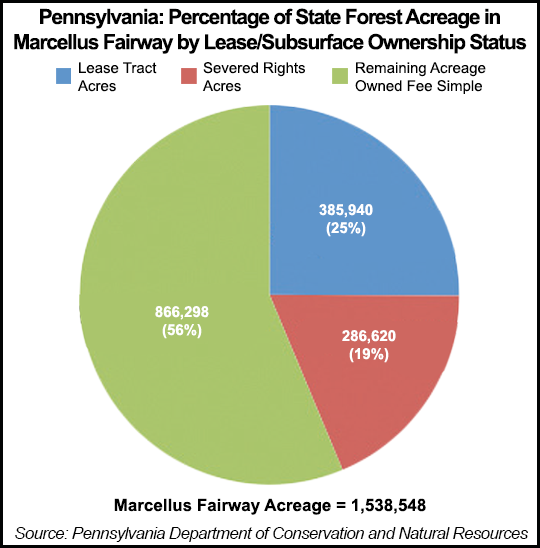Marcellus | E&P | NGI All News Access
Pennsylvania Court Upholds Executive Order Authorizing Leases on State-Owned Land
Pennsylvania’s Commonwealth Court has ruled to uphold an executive order issued by Gov. Tom Corbett to lift a four-year moratorium on subsurface oil and gas leases in state parks and forests, determining that revenue from those leases could go toward the state budget rather than a special fund for conservation.

It’s unlikely there will be a rush of new leasing, however, since Democratic Gov.-elect Tom Wolf, who will bring in his own team when he takes office in less than two weeks, has said he doesn’t favor oil and gas development on state-owned land.
Corbett issued the order in May as part of his budget for this fiscal year and later signed legislation authorizing the transfer of money from the state’s Oil and Gas Lease Fund, which is earmarked under a 1955 law for conservation uses (see Shale Daily, May 23, 2014). In doing so, he reduced general fund appropriations to the Pennsylvania Department of Conservation and Natural Resources (DCNR). Corbett said new subsurface leases in state parks and forests would help generate an additional $95 million and help to balance the budget.
But the DCNR — created in 1995 to handle the state’s mineral rights and protect natural resources under the Conservation and Natural Resources Act (CNRA) — was temporarily barred from issuing any new leases over the summer (see Shale Daily, July 21, 2014). The state had negotiated an agreement with the Pennsylvania Environmental Defense Foundation (PEDF), which had filed a request for a preliminary injunction to halt Corbett’s proposal.
The PEDF first filed a lawsuit in 2012 challenging public leases issued in 2008 and 2010. The organization then alleged that the Corbett administration and the General Assembly had violated state law and the constitution by appropriating money from the Oil and Gas Lease Fund for general purposes without also properly considering the effects such leases would have on public lands. It said such money should go toward conservation efforts instead.
Although the state legislature appropriated revenue from the Oil and Gas Lease Fund for general purposes in 2010, the court chose not to rule on those sales or the 2008 leases, saying the parties involved were not part of the case. PEDF argued that Corbett and the General Assembly had violated the state constitution by directing DCNR to lease state land for the purpose of generating revenue for the state budget. In particular, they claimed that Corbett and legislators — as trustees of the state — had violated Article I, Section 27, a rare environmental rights amendment.
It reads in part that the “people have a right to clean air, pure water, and to the preservation of the natural scenic, historic and esthetic values of the environment.”
But while the court acknowledged their role in protecting the state’s natural resources, it also said elected officials are responsible for funding state operations.
“Decisions to reduce a general fund appropriation are matters of policy,” the court said in its ruling. “Whether monies in a special fund may be used for a particular purpose, however, is a question of lawful review by the court.
“The decision by the general assembly, reflected in the statutory language, to vest in itself the power to appropriate certain monies in the lease fund does not by itself infringe upon the rights afforded the people of this Commonwealth under the Environmental Rights Amendment. Nor does the decision reflect a failure by the General Assembly to act consistent with its trustee obligations under Article I, Section 27.”
The court also reaffirmed that it is DCNR’s task alone to initiate and lease state land, not the governor’s.
“Based on the CNRA…the ultimate decision lies exclusively with DCNR, and DCNR therefore is accountable for making the decision to lease and, if challenged, justifying it,” the court said. “To the extent additional leasing of state lands is under consideration, the court believes that DCNR is positioned to act consistent with its Article I, Section 27 duties and obligations.”
Corbett’s Energy Executive Patrick Henderson, though, said the governor never ordered DCNR to lease state-owned land. Instead, he said Corbett merely lifted Rendell’s moratorium and opened the door for such an option.
“The Commonwealth Court upheld the constitutionality of the action and rightly said these are policy questions,” Henderson told NGI’s Shale Daily. “Whether or not to actually lease land is a policy question.
“Sitting here and saying Gov. Corbett said to DCNR ‘go lease this tract or that tract wasn’t the case,” Henderson added. “The court simply said the statute authorizing leasing says DCNR shall enter those leases. As a practical matter, that’s how it’s always been. Never in four years have we ordered DCNR to lease land.”
With less than two weeks left in Corbett’s term, Henderson said it’s unlikely that DCNR would rush to authorize any new leases, especially with a Democratic governor taking office and a new DCNR secretary on the way. Wolf has indicated that he’s not in favor of oil and gas development on state-owned land.
The PEDF said it was upset that the court did not rule on the broader constitutional questions it posed and added that it would appeal the ruling.
© 2024 Natural Gas Intelligence. All rights reserved.
ISSN © 2577-9877 | ISSN © 2158-8023 |
